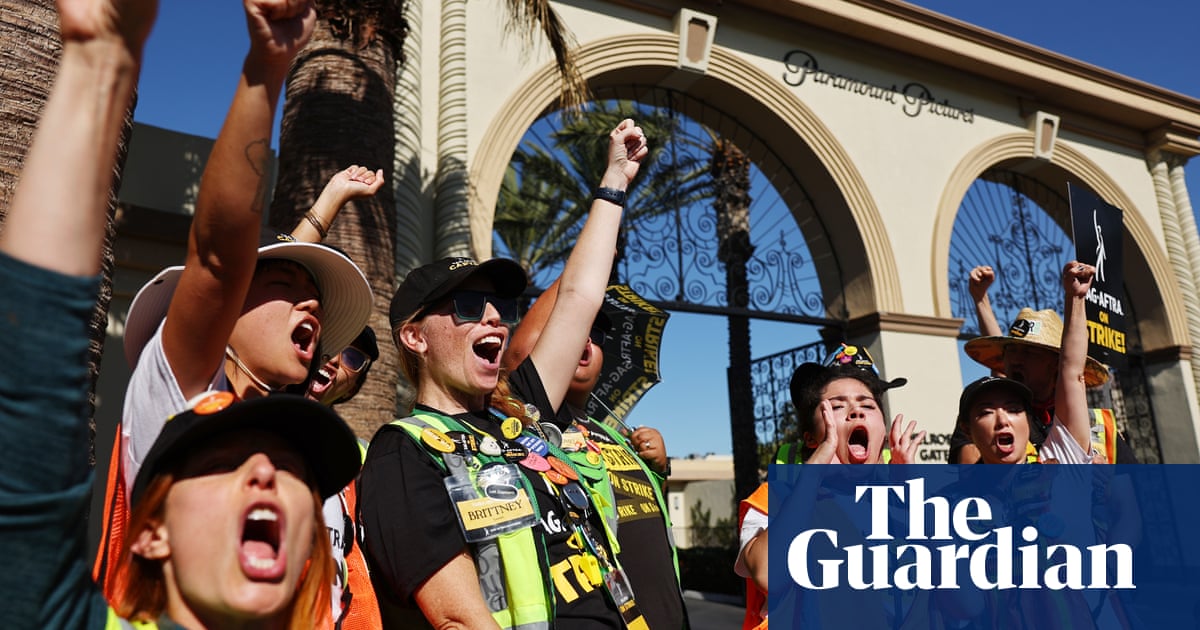
When Apsana Begum found out she had been acquitted of housing fraud by a jury at Snaresbrook crown court, she fell to her knees and wept.
“It was such an emotional moment,” says the 31-year-old Labour MP for Poplar and Limehouse. “For at least 18 months, I have just tried to hold it all together.” We are meeting at a cafe in her constituency, chosen for its tucked-away location – if Begum is spotted on one of the busier streets, she will be accosted constantly by well-wishers. “It’s where I grew up,” she explains.
Until now, Begum has been unable to speak about the case, for legal reasons. Her enforced silence has, at times, felt oppressive. “I was gagged, until I was able to tell my story [in court] and say what actually happened,” she says. “To have to hold back when there has been so much being said about you and your name is being dragged through the mud …” At the same time, the trial forced her to speak, in open court, about matters few would gladly make public: her marriage to her ex-husband, Ehtashamul Haque, a Tower Hamlets councillor; the abuse she alleges she endured at his hands; and her estrangement from her family, who disapproved of the relationship.
Last month, the court accepted Begum’s account of events, in particular her claim that Haque, whom she characterised as emotionally abusive and controlling, had applied for council properties under her name without her knowledge. The verdict was the culmination of an 18-month battle for the British Bangladeshi politician, one that has overshadowed her first term as an MP.
Haque denies all the allegations against him. “I am innocent and the allegations made against me have no basis,” he says. “I look forward to any investigation or legal process to enable me to clear my name.”
Begum first realised her housing status was going to be an issue on the very day in November 2019 when she was officially nominated as the Labour candidate for her constituency. Two members of her campaign team contacted her in alarm: WhatsApp messages were circulating, accusing her of housing fraud.
Her initial instinct was to dismiss them – this wasn’t the first rumour to be spread about her locally. (During the early days of her campaign, Begum was persistently, and inaccurately, characterised as the protege of the disgraced Tower Hamlets mayor Lutfur Rahman, even though she says she was only an administrative assistant at the time.) “I just couldn’t quite believe there was anything to it,” she says.
Things snowballed quickly. Newspapers began to report on the allegations. A resident confronted her at a constituency hustings, demanding to know why she, a single woman with no children, had been given a council flat. Nonetheless, Begum won the seat comfortably in December 2019, increasing Labour’s majority.
Then, in January 2020, she received a phone call from Tower Hamlets council, asking her to come in for an interview about her housing application. “I was shocked … I didn’t think there was anything to it,” she says. Begum went to the interview, accompanied by a lawyer. The council presented her with its evidence against her; she says it was as follows.
In July 2011, Begum applied to the council’s social housing register. She was a new graduate, picking up temp work in call centres and living in her family home, along with her aunt, her sister, her brother and her parents. Because she described the house in her application as having three bedrooms, it was classed as overcrowded, meaning that Begum received priority in the social housing queue.
But Tower Hamlets council claimed that Begum had, in fact, lied about not having her own bedroom. As evidence, it presented Begum with two forms, submitted by her mother and her aunt, that stated that the family home was a four-bedroom property, not a three-bed. Begum was bewildered. “I never understood it to be anything other than three bedrooms,” she says. She adds that she shared a bedroom with her aunt and sister.
The only explanation she could think of was that, when her mother moved into the family home, it was advertised as a four-bedroom property. But the fourth bedroom was used as a dining room. Begum says: “I think she thought, legal-speak, maybe she’s supposed to put down four.” Begum believes that her aunt most likely copied her mother’s form. Neither were called on to give evidence in court.
Tower Hamlets council also alleged that Begum failed to notify it when she moved into her husband’s flat in May 2013. Had it known of her changed circumstances, Begum would have been downgraded from the housing register’s priority category. In effect, she would have gone to the back of the queue, making it highly unlikely that she would have received social housing, as the housing register in Tower Hamlets is vastly oversubscribed.
“I definitely informed them,” Begum says. She says she told the council tax department, thinking it would automatically pass on the message. “I assumed all these departments talked,” she says.
Begum characterises this period of her life as chaotic and traumatic. Her father, Manir Uddin Ahmed, died in 2012 when she was 22. Ahmed was a Tower Hamlets councillor and sparked her interest in politics. Her face lights up when she remembers him. “He was definitely somebody who I considered to be my inspiration,” Begum says. “He had six daughters; he was very progressive.”
Begum and Haque started a relationship in 2011, but her family learned about it only after her father died. They did not approve. “Some of it was the way it happened,” Begum says. “They felt it hadn’t been presented honestly to them from the start. They expected, culturally, for there to be a marriage proposal that arrived through extended family or relatives.” Her sisters had arranged marriages and there was an expectation that Begum would, too. “I was the first one in my family to say: ‘I have fallen in love with someone and want to marry them,’” she says. Plus, Haque was twice divorced and older than her.
Today, she characterises her family’s response as misguided, but not malicious. “They felt very protective, like: do you really know what you’re getting into? This is going to be the rest of your life,” she says. In court, Begum said that her brother locked her in a room and followed her to work, causing her to fear that she would become a victim of “honour”-based violence. She has rebuilt her relationship with him in recent years. “He has changed,” Begum says.
She did not see the estrangement coming: “I never in a million years ever thought I would get disowned in that way.” No one from her family came to her wedding in May 2013; afterwards, she got a message telling her that her things were in bin liners outside the family home. “Within six months, I lost my entire family,” Begum says, softly.
Initially, the marriage was loving. “In those early days, I absolutely did love him and I genuinely was his biggest advocate,” Begum says. She pauses. “But I guess, even then, there might have been a level of deception that I wasn’t necessarily aware of. Often I get asked: ‘When did you realise? When did it start?’ And I find it hard to answer this, because I have to say: actually, it was probably always there from the start. But I only realised much later in the relationship.”
In October 2020, five years after she had separated from Haque, Begum was told the case would be going to trial. “That was really devastating, because it had been made known to me through political circles that this had something to do with my ex-husband and his family,” she says.
As she understands it, two complaints triggered the council’s investigation. One, she says, was from her ex-husband’s brother-in-law, Sayed Nahid Uddin. Begum sees this as being linked to her ex-husband. It was “an extension of the abuse and an attempt to reinstate control … this was so malicious,” she says. The other, she alleges, was from Peter Golds, a Conservative Tower Hamlets councillor. “This really felt like a political persecution,” Begum says.
Uddin did not return requests for comment. Golds declined to comment, but referred to a statement put out in July by Tower Hamlets council, which denied any political motivation. A spokesperson for the council said: “We have a duty to investigate any allegations of housing fraud in order to ensure public money is spent correctly and that those waiting on our housing register are treated fairly. After reviewing the evidence with the benefit of independent legal advice, it was found to be strong enough to bring the matter to court, where it was agreed there was a case to answer. We fully accept the verdict, that justice has run its course and that the matter is now closed.”
The run-up to the trial was gruelling. Begum received Islamophobic and misogynistic messages on social media and to her parliamentary email account. “There were a lot of references to wanting to see me deported,” she says. (During the trial, the judge struck her address from the record, out of concern for Begum’s safety.) In addition to her work as a first-term MP during a pandemic that disproportionately affected her constituency, Begum had to grapple with the looming nightmare of the court case. Unsurprisingly, her mental health suffered. “There were times where I felt that I was really alone,” she says.
Some fellow Labour MPs reached out to her with messages of support, mainly those who, like Begum, are on the left of the party. (Begum is a member of the Socialist Campaign Group of MPs.) She namechecks Dawn Butler, Diane Abbott and Bell Ribeiro-Addy: “They were calling, asking if things were OK.” John McDonnell attended Begum’s trial, giving her a character reference. “That was really meaningful,” she says. Jess Phillips, who handles Labour’s domestic violence brief, also reached out. But from most of the party, there was silence. I ask whether Keir Starmer was in touch before the trial. Begum equivocates, before confirming that he did not. “Um, I didn’t have contact much before,” she stammers.
In court, Begum alleged that she was financially and emotionally abused by her ex-husband. “[I was] faced with a huge amount of pressure to help clear up debt and to help support his family,” she says. She adds that Haque was routinely in “financial crisis” and she felt pressed to take out a £10,000 loan to clear his debts. “I didn’t have financial independence. I was really struggling at times.”
As the relationship progressed, Begum says, “it became quite abusive. I felt completely trapped. Powerless.” She accuses Haque of sabotaging her relationship with her friends and forbidding her from seeing a male therapist. She says he would secretly drink alcohol and put pressure on her to have sex. After leaving the relationship, Begum read the work of the domestic abuse expert Dr Jane Monckton Smith and recognised many of the patterns she identifies in coercively controlling men. “I thought: oh my God. I recognise this,” Begum says.
During the trial, Begum was presented with evidence that she had been applying for council properties during her marriage to Haque. She says that Haque did this without her knowledge. “I can’t explain his behaviour, but at the same time I feel he may have been [applying] because he’s the only other person who would really have known that I had an application [for social housing],” she says. “I was somebody who would have a notebook and I’d always have my logins for everything written down.” Again, Haque says he is innocent of all allegations.
In October 2015, Begum ended her marriage, after finding out that Haque had cheated on her. “That month leading up to it, I was so alone,” she says. She was sleeping in the living room, with the sofa pushed against the door, so Haque could not get in. “He would argue outside it and be like: ‘You’re treating me as though I’m a bad man. I’m not going to hit you.’ That was the only place I would find peace.”
She waited until her husband had an appointment in another city before fleeing. “If I’d done it in front of him, I wouldn’t have been able to do it,” she says. “That’s probably when it would have actually got violent.” Afterwards, she claimed in court that Haque followed her in his car and bombarded her with messages, causing her later to call the police.
She moved back in with her family; her sisters brokered her return. “I didn’t want to hear the ‘We told you so,’” says Begum. “There was a bit of that; I bit my tongue.” She slept on a sofa in the living room. It was under these circumstances that she once again applied for social housing, after calling the council for advice. She was still in a priority group on the housing register, though the council would later allege she should not have been.
She was successful in her application and moved into a one-bedroom flat in March 2016 – almost five years after she first applied for social housing. By now, she was working as a diversity officer, earning about £30,000 a year. Why didn’t she just rent privately?
“I didn’t think to myself that I would get housed as quickly as I did,” she says. “I was just getting back on my feet. And maybe there would have been other options I would have discovered if I had friends and networks and things that I could tap into to be like: what do I do in this situation?”
It is hard to believe, however, that Begum, a university graduate who grew up in London, would not have been able to navigate the private rental market. It is harder still to square the fact that she continues to live in that flat to this day, even though she is paid £81,932 a year as an MP and there are thousands of people waiting for social housing in her borough. (The income cap for those applying for social housing in Tower Hamlets is £90,000 a year.)
“I am probably in a much better position now than I was when I first contacted the council for support,” Begum says. “And so it is something that I am thinking about: is it something that I need? And it’s probably not something that I need. It’s something that I should maybe consider or think about moving on from.” Perhaps it should not have taken her nearly two years to realise that an MP with an annual income nearly three times the average UK salary should not be taking social housing away from others in desperate need.
However, the court accepted Begum’s argument that she never intentionally deceived Tower Hamlets council and that she was instead a victim of coercive control and financial abuse. After her acquittal, the former shadow cabinet minister Jon Trickett said there were “serious questions about this flawed prosecution” that need to be answered. The council has since faced criticism for its decision to prosecute Begum, given her ex-husband’s connection to the case. “It was vexatious and malicious,” says Begum of the trial.
For now, she is attempting to rebuild her political career. She tells me that she would consider a frontbench position, if offered one. “Never say never,” Begum says. “But, at the same time, I’ve just come out of this really big, massive ordeal and I’d like to hit the ground running in the constituency.” Starmer has reached out privately, though he has not made a public statement of support. “[He said] he’s really glad to hear the result and looks forward to continuing to work together,” she says.
It is noticeable that many of the Labour MPs who have expressed support for Begum are people of colour, specifically black women, mindful perhaps of the racist abuse Begum has received on social media. (Ribeiro-Addy, Butler and Kate Osamor were among the first to congratulate Begum; Imran Hussain, the shadow employment rights minister, has tweeted about “the spiteful campaign” against her.) “I would hope that, going forward, there is as much open public support as is possible,” she says.
As Britain’s only hijab-wearing MP, Begum would be an asset to the Labour leadership. Recent months have seen Muslim community leaders warn that the party is in danger of losing its Muslim voters. Had Begum been convicted, George Galloway – who made sizeable inroads into Labour’s vote share in the divisive Batley and Spen byelection in July – would probably have targeted her seat. Does she think that Starmer takes Muslim voters for granted? “We’ve definitely got serious questions to ask ourselves as a party in terms of Muslim voters,” she says. Begum describes Starmer’s decision to abstain on the “spy cops” bill, which authorises undercover officers and informants to break the law with impunity, as “frustrating”. “It was clear that the impact of the bill would be increased surveillance of Muslims,” she says.
She is determined to use her experience of abuse to improve safeguards for other people in her situation. And she is rebuilding her relationship with her family. “The case has been difficult for them as well,” she says. “They never signed up to be in the public eye.”
Although the last year and a half has been an ordeal, Begum is not embittered. “It’s out there now,” she says, peaceably. “It’s something that I will have to live with, right? This is something that happened to me and this is something that is an element of my life. Now I have to just carry on.”












